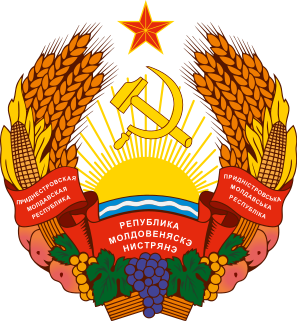Related Research Articles

The European Court of Human Rights, also known as the Strasbourg Court, is a supranational court of the Council of Europe which interprets the European Convention on Human Rights. The court hears applications alleging that a contracting state has breached one or more of the human rights enumerated in the Convention or its optional protocols to which a member state is a party.

The Christian-Democratic People's Party is a Christian-democratic political party in Moldova. The party was led by Iurie Roșca from 1994 until 2011. Until 2005, the PPCD and the (Moldovan) National Liberal Party were the main political organizations in the country supporting the unification of Moldova and Romania. After the PPCD began supporting the anti-unification Communist President Vladimir Voronin, the party has lost its unionist credentials while other parties such as the Liberal Party have taken over the pro-Romanian ideological space. The party has had very poor results in all subsequent elections. Since April 2005, the PPCD has lost several deputies, mayors, councillors and members to the liberal-democratic parties. The PPCD was an informal coalition partner of the Party of Communists of the Republic of Moldova from 2005–2009.

The Human Rights Act 1998 is an Act of Parliament of the United Kingdom which received Royal Assent on 9 November 1998, and came into force on 2 October 2000. Its aim was to incorporate into UK law the rights contained in the European Convention on Human Rights. The Act makes a remedy for breach of a Convention right available in UK courts, without the need to go to the European Court of Human Rights (ECtHR) in Strasbourg.
Ilie Ilașcu is a Moldovan-born Romanian politician, famous for being sentenced to death by the separatist Transnistrian government for alleged involvement in two murders and for actions which have been described as Moldovan state-sponsored terrorism by Transnistrian government officials.

The Transnistria War was an armed conflict that broke out in November 1990 in Dubăsari between pro-Transnistria forces, including the Transnistrian Republican Guard, militia and Cossack units, and pro-Moldovan forces, including Moldovan troops and police. Fighting intensified on 1 March 1992 and, alternating with ad hoc ceasefires, lasted throughout the spring and early summer of 1992 until a ceasefire was declared on 21 July 1992, which has held.
The Moldovan schools in Transnistria became an issue of contention in 2004 in the context of the disputed status of Transnistria, a breakaway region of Moldova since 1990/1992.

The state of affairs with human rights in Transnistria has been criticized by several governments and international organizations. The Republic of Moldova, and other states and non-governmental organizations (NGOs) claim that the government of Transnistria is authoritarian and has a record of arbitrary arrest and torture.

This timeline of events is a chronological list of incidents and other notable occurrences related to the War of Transnistria, including events leading up to the war.
Tudor Panțîru is a Moldovan and Romanian judge, politician and diplomat, former President of the Constitutional Court of Moldova, and international judge of the Constitutional Court of Bosnia and Herzegovina since 2002.
Soering v United Kingdom 161 Eur. Ct. H.R. (1989) is a landmark judgment of the European Court of Human Rights (ECtHR) which established that extradition of a young German national to the United States to face charges of capital murder violated Article 3 of the European Convention on Human Rights (ECHR) guaranteeing the right against inhuman and degrading treatment. In addition to the precedence established by the judgment, the judgment specifically resulted in the United States committing to not seek the death penalty against the German national involved in the case, and he was eventually extradited to the United States.
Slivenko v. Latvia (48321/99) was a case argued before the European Court of Human Rights and decided in 2003.
Benthem vNetherlands was a European Court of Human Rights case on the right to a fair trial. It concerned the grant of a permit by a municipal authority, with which the Dutch Government, then referred to as the Crown in legal cases, disagreed. Several legal proceedings were brought in respect of this permit, which were ultimately decided by the Government itself, under the Kroonberoep procedure.
D.H. and Others v. the Czech Republic was a case decided by the European Court of Human Rights concerning discrimination of Romani children in the education system of the Czech Republic.
Leela Förderkreis e.V. and Others v. Germany was a case decided by the European Court of Human Rights in 2008.
Tănase v. Moldova was a case decided by the European Court of Human Rights in 2010.
Schalk and Kopf v Austria is a case decided in 2010 by the European Court of Human Rights (ECtHR) in which it was clarified that the European Convention on Human Rights (ECHR) does not oblige member states to legislate for or legally recognize same-sex marriages.
Kokkinakis v. Greece is a landmark case of the European Court of Human Rights, decided in 1993 and concerning compatibility of certain sanctions for proselytism with Articles 7 and 9 of the European Convention on Human Rights. It ruled by a vote of six-to-three that a Jehovah's Witness man's freedom to manifest his religion, protected by Article 9, had been violated by the Greek government. One of the judges wrote that this case was "of particular importance" because it was "the first real case concerning freedom of religion to have come before the European Court since it was set up" in 1959.

McFarlane v Relate Avon Ltd[2010] EWCA Civ 880; [2010] IRLR 872; 29 BHRC 249 was an application in the Court of Appeal of England and Wales for permission to appeal against a decision of the Employment Appeal Tribunal, that a relationship counsellor dismissed for refusing to counsel same sex couples on sexual matters because of his Christian beliefs did not suffer discrimination under the Employment Equality Regulations 2003. The application was heard by Lord Justice Laws, who issued his decision on 29 April 2010 refusing the application.
X and Others v. Austria 53 ILM 64 was a human rights case that was decided in 2013 by the European Court of Human Rights (ECtHR). The case concerned whether the Government of Austria had discriminated against Austrian citizens who were in same-sex relationships because the wording of the Austrian Civil Code did not permit unmarried same-sex couples access to legally granted second-parent adoptions, whereas it was available to unmarried heterosexual couples.